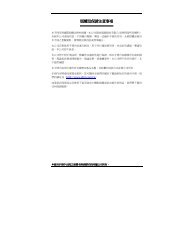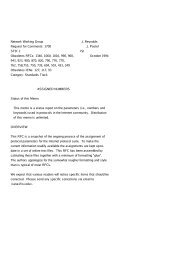Network Working Group R. Fielding Request for Comments: 2616 ...
Network Working Group R. Fielding Request for Comments: 2616 ...
Network Working Group R. Fielding Request for Comments: 2616 ...
You also want an ePaper? Increase the reach of your titles
YUMPU automatically turns print PDFs into web optimized ePapers that Google loves.
<strong>Fielding</strong>, et al. Standards Track [Page 72]RFC <strong>2616</strong> HTTP/1.1 June 19994. It may limit a public cache's ability to use the same response<strong>for</strong> multiple user's requests.HTTP/1.1 includes the following request-header fields <strong>for</strong> enablingserver-driven negotiation through description of user agentcapabilities and user preferences: Accept (section 14.1), Accept-Charset (section 14.2), Accept-Encoding (section 14.3), Accept-Language (section 14.4), and User-Agent (section 14.43). However, anorigin server is not limited to these dimensions and MAY vary theresponse based on any aspect of the request, including in<strong>for</strong>mationoutside the request-header fields or within extension header fieldsnot defined by this specification.The Vary header field can be used to express the parameters theserver uses to select a representation that is subject to serverdrivennegotiation. See section 13.6 <strong>for</strong> use of the Vary header fieldby caches and section 14.44 <strong>for</strong> use of the Vary header field byservers.12.2 Agent-driven NegotiationWith agent-driven negotiation, selection of the best representation<strong>for</strong> a response is per<strong>for</strong>med by the user agent after receiving aninitial response from the origin server. Selection is based on a listof the available representations of the response included within theheader fields or entity-body of the initial response, with eachrepresentation identified by its own URI. Selection from among therepresentations may be per<strong>for</strong>med automatically (if the user agent iscapable of doing so) or manually by the user selecting from agenerated (possibly hypertext) menu.Agent-driven negotiation is advantageous when the response would varyover commonly-used dimensions (such as type, language, or encoding),when the origin server is unable to determine a user agent'scapabilities from examining the request, and generally when publiccaches are used to distribute server load and reduce network usage.Agent-driven negotiation suffers from the disadvantage of needing asecond request to obtain the best alternate representation. Thissecond request is only efficient when caching is used. In addition,this specification does not define any mechanism <strong>for</strong> supporting













